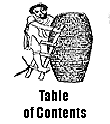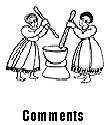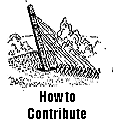
|
 To: Lullit Subject: "Boutique Deprivation" and other short stories I could not resist the temptation to choose a word that is so obviously begging for deconstruction ... Is Lullit the softer version of "L’ul - it", i.e. a female L’ul? A female prince? Should the word not be "L’ilt" or even "L’ilt - it"? One denotes a female version of something inherently masculine , and the other an elevation and grandeur on (her) own terms. Or perhaps Lullit is a female "Lul" - an orb, a globe? In which case why do we not have "Lul" for a male’s name? Ha! Your description of the long luuk wereqet letters and "sight love" took me back to some fond memories, many earnest youthful passions and funny anecdotes. I remember one story where the unwitting deliverer of the letter was a (much) younger brother, which drew an indignant series of letters from his older sister who was supposedly pissed at seeing her baby brother being used in this fashion. But (I suspect), secretly happy to have an illicit communication with someone who has made the cardinal crime of admitting he has fallen for her. While I do not remember seeing or even hearing about the "gTm tera" (would it be between Gojam Berenda and Bereberé Tera, I wonder) you described, it struck me as being so characteristically Ethiopian. We are a very sentimental bunch, a people whose calm mannerisms and quiet exteriors hide emotional tempest and passionate turmoil that needs a little effort to nudge out, gn andé keweTa, wa!! The girls would look for flower adorned luuk pages, perhaps perfumed a little, onto which hearts are poured out. For the guys, original mass market verse is better than "smi anchi ...!!" In fact, now that I think about it, I bet you the first - and perhaps for many, the only - piece of original writing must be the ubiquitous "Iné iwedishaleu- twejiN indehone, meliktun lakibN" variety. For a society where young "love" is heavily frowned upon, who better for pouring out heart and soul to than the uncomplaining ink, and the faithful paper. The only question then becomes that of delivery, which is perhaps a topic best tackled in SELEDA’s "Transportation" issue. Not only did I read "The Black Lions", I own a copy, given to me by a good friend. It was interesting that one of the consistent things he picked up on other than the fact that there is as of yet no Ethiopian writer who has made a living out of his or her craft, is that the authors who sprang up in post-war Ethiopia seemed to hold a special reverence for "wubé bereha." Wubé bereha is the nickname given to what was more formally known as "Dejach Wube Sefer", a warren of bars and famed madams running "sétiNa adarinet" (now there’s a phrase for you - wonder if I can make a living through "wendNa adarinet"?) establishments. Perhaps, that is where much "living" happened. By the time I grew up, that area was all passé. A new generation of writers will have to confess to their own wubé bereha ... Something tells me though the newer generation’s wubé bereha consists of "sdet, isirat, grfiya." There are tons of stories not yet told, and we will have to wait and see. But I suspect we will not have the giants of Haddis Alemayehu’s caliber, someone who was both an official and a patriot, educated in the classical sense and in the ways of the technologically yefereTeme world. Wasn’t it in "The Black Lions" that he is quoted as saying he originally meant "Fqr Iske Meqabr" as an English work? Which is why I asked you the question. Why do you write? Why do I write? I remember talking to a friend years ago. He had been to Kercelé for being heavily involved in politics. Despite the quite substantial difference in our ages, one of the reasons he and I met and became good friends was because of our love for reading. We would devour books that came our way. Anyway, one day, strolling along, I volunteered the information that at some point in my life, I would love to write a book. It was a shock when he shot me down very quickly, saying that I could not. His reason was that he believed that I essentially had nothing to say. I hadn’t lived. I hadn’t suffered. I hadn’t yet felt indescribable joy, or indelible pain. And before I could say I experienced any of those things, I came to America, the land of relative peace, abundance and opportunity - so unless I wanted to experience "boutique deprivation" through some voluntary activity paid for through my Mastercard, I could forever be doomed to a life of the spiritually vacuous. But, I console myself. He was wrong. Megerefed, and metasered I may not have been, but I am one of the minions who live through self-imposed sdet. More than that though, I think I write to tickle my esthetic bone. Purely for the joy of a particular turn of phrase. The wonder that the same thing can be described as "kenfer" and "lemboCH", and mean vastly different things. The challenge of expressing your sensation when a plane takes off and pushes your guts in. To close this session, I got another gem to match your "Marksawi Leninawi Mezgebe Qalat". And that is the recent charming little book from the Ethiopian Academy of Languages called An Amharic-English Science and Technology Dictionary. And in typical Ethiopian fashion, the definition for a "function" depends on whether you are a chemist, a statistician, a physicist or a mathematician. While the former three duke it out for some variation of the word "gebir" or "agbari", the math dudes settle for the grand "qn tezamdo." Ah, such beautiful phraseology - it ain’t just your daddy’s old just "tezamdo", and it ain’t the "yemayqena" type either. Yené ihit - sle qebero qnat, I have to think about that one ... Yared. To: YaredFrom: Lullit Subject: The Generation That Cut Off It’s Literary Neck. Dear Yared, Positively undone by your conjugation of the world Lullit. I am actually called Qdst Gabriel, baptized by a priest in Qulubi as I am ye silet lij, believed to have been given by God, despite the doctors’ discouraging words. With Gabriel watching, it is said, I was conceived on the Red Sea during my parents’ working holiday in Assab. Hence, the name "Lullit", based on the word "Lul" which, according to my parents and Desta Teklewold's dictionary is "ke behar yemigeN inqoo", precious gem gained from the sea, ... PEARL! Lullit is "little pearl". I wonder what your Kristina sm name is ... So Yared, I see you have the Amharic-English Science and Technology Dictionary! Excellent! Iski, benatih, if you have a copy nearby, please make my day and tell me again the hilarious Amharic word for television! Is it something about magic and boxes? WORDS. Don'tcha love it? WORDS, WORDS, WORDS! Beating them into plough shares and back into swords again, crocheting them into a green-yellow-and-red dantil (called Tsehay Gibat style) and above all, NOT resisting the temptation to deconstruct them one by one. Yared! I can tell you really love words too! But I often wonder if it is, as you say, "purely" an addiction to the "joy of a particular turn of phrase" or if there isn't something deeper, an instinct more basic. I’m talking about that classic Ethiopian cultural idiosyncrasy of wanting to understand EXACTLY what is being said (or not said). Does this explain better a desire to medabess, magelabeT and maquolameT each word and all its definitions? "Min lemalet feligo/feliga new?" How many times have you heard that in your lifetime, Yared? Aren’t we all "DeL’Habesh", excellent wordsmiths, lexicographers, budding literary critics and authors all rolled into one neat wax and gold gursha? Bel inka iski here is your LD gursha for the day and brace yourself cause it’s a big one ... (would you believe it? The first two paragraphs I wrote above were only the MENDERDERIA! - Another excellent word !- Gudih fela mechess ... chalew ingidih yene wendim. OK, Let me start this ... You have raised a very interesting point about WRITING and the RIGHT to WRITE. It had me thinking for hours after I read your message. First, allow me some space and excuse me Yared because I want to start with a little shillela and zacha here, for if anyone told me that a writer had to show his scars before he was deemed credible, I would tell them to go to ghannem. In fact, Yared, pardon my French further but if a "friend" told me that I should not write because I had nothing to say I woulda kicked and "kurkum"ed the ("rejim guzo/achr guzo" dichotomy and all other mistakenly internalized detailed conceptual paradigms") ~~*&% clean out of his/her confused head. I often wonder with rage about who originated this theory that the intimate knowledge and first hand experience of suffering and poverty, political strife and armed struggle are the only kitabs that identify the true Ethiopian and make him more deserving of a license to speak and write about Her, about being Ethiopian, or even deserving of the right to write at all! What drivel! I hate to speak in parables, Yared, but here goes two images I console myself with when I meet jerks like your "friend" promoting their "tat and kak" theory. Actually, "console" implies a licking of wounds, the need for time to recuperate. No, Yared, let me rephrase that. Here are two images to fight with and reject such nonsense. Two images that say "imbi" and sustain the soul. The first image is a true story, by the way. A young man is being tortured and beaten to make him speak and get him TO WRITE his confession. He can’t stand it anymore and asks for a glass of water. As the powers that be relax and sit back in anticipation of his submission, he deftly breaks the glass and grabbing his tongue with his left hand quickly and cleanly cuts it off with his right hand using his new found glass knife. Let us call that image ZIMITA. And then there are these reeds, Image two. Growing peacefully, happily by the River Nile, are these reeds... Suddenly, the Hand of God, or maybe it’s the paw of an animal, that beast called Abyiot which eats her children, cuts down these reeds and scatters them near and far to foreign places where they all lay drying out in the sun, wind, rain, snow and wilderness. Are these exposed reeds now utterly useless, dead, making no statement? Are they meaningless? Of course not! This is the "washint generation", and to pick them up and to play them is to make music. The melodies are different but all invariably have the sound of the memories of their original habitat and state of being, whichever washint is played and whatever way it is played. Mn lemalet feliga new? I hear you ask. What I am trying to say is that I don’t think being Ethiopian and having the right to write is determined by a game of musical chairs where, if one leaves the country for one reason or another, one automatically loses a seat in the game. A game with ever decreasing chances of staying in, by the way. That qrCHa-like experience of our country’s turbulent socio- economic and political times, the slaughter, the blood, the gluttonous consumption against a backdrop of graceful mattat, the sight of men in the dawn light with blood on their hands, the blood spattered Adey Abeba catching the first rays of the Fasika morning. "QrCHa new, QrCHa new, grab your piece quick!!! Dig in, dig in, into either the newly found power/wealth, or dig, dig the new trenches, dig the new soldiers’ graves ..." You see, Yared, I don’t dig it. So, like you, having declined all invitations to attend the "kirchanization" of Ethiopia, I too am a minion of the Million-Man march out of Ethiopia onto greener pastures, and money, and peace of mind. But so what? Does that mean I have nothing to say nothing to write? Pardon my guramaylé but ... ye beré ar! Besides, "nothing to say" is a relative term because I know that those in the eye of the storm, like the guy in the torture chamber also have "nothing to say". Even as we exchange our LD’s Yared, the "last of the Mohicans" editors of Ethiopia’s "free press", the editor of Seife Nebelbal has just left the country, choosing to have nothing to say and becoming yet another Ethiopian refugee. But that doesn’t mean if he leaves he is no longer qualified to write. We all have a scar, a suffering, a song or a story that should and no doubt will be written about. Here endeth the sermon. Where were we? Ah yes Literature!! It is true that the literary giants of Haddis Alemayehu and the eminently eloquent and accurate historical writers such as Sergew Hable Sillassie are priceless and irreplaceable natural resources of Ethiopia. However, the recent books that provide general reviews of contemporary events and historical milestones, evaluating and reflecting the past realities of Ethiopia, indicate to me that this age, this time, is more a period of reclaiming and reconciling histories, cultural identities and social realities of the country. Yohannes Meshesha's review of Ethiopian political history from Menelik to HaileSilassie; the current best selling, easy to read but voluminous work "Ye Eritrea Gudai"; Aberra Djemberay’s short but touching diary of his early days of Derg imprisonment, "Ye Issir Betoo Abessa" ... The many, many various types and editions of personal diaries from the qey shibir/nech shibr holocaust/genocide. More happily, the flowering of cultural anthologies in Amharic reflecting Ethiopia’s multicultural wealth, written in Amharic, the national language, (starting with the detailed and very enlightening "Ye Guragay Behereseb Tarik"); and last but not least, to mention the great leap backward and amazing azuro mayet perspective provided by the almost confessional edition of The Generation Part Two, Mea Culpa Mea Culpa Mea Culpa ... I believe we are in a sort of literary catharsis, a decompression chamber, and it is in fact the lull before the storm that will inevitably lead to a surge in efforts to conquer new literary styles, heights and previously unimagined "technology yefereTeme" areas of literature and linguistic achievement. (I mean, if you have any doubts take SELEDA as an early indication of this, am I right or Am I wrong Mr. Yared?) I have no doubt, also, that handwritten manuscripts lie carefully covered in many a steel-and-Qorqoro shantas, under many a bonda frashs and bret algas. Something I don’t understand very well that has to do with demand and supply, and theories of elasticity will one day make it worth somebody’s time to print them all ... Ayqerim. As they say..Ale gena, ale gena. Personally, Yared, I look to the enduring and trailblazing work of the invisible Ethiopian playwright for inspiration and sustainable hope. I witnessed recently how playwrights had the whole of Addis Abeba glued and riveted to their radio every Sunday, and remember especially this play/series about a girl who gets AIDS while she is at University. The language, the timing, the drama, moving the whole city to listen every Sunday, to learn without even feeling it ... And then there is that sensational "off Broadway" production "Deha Adeg", which after two years of playing in dingy tea rooms and barren hallways to standing room only audiences who had suffered long queues for tickets, has been running for one year at the Russian Cultural Center in Cathedral, still packing them in, still anjet marassing the queuing audience, which still rises for a tumultuous standing ovation after every performance. Sheer poetry, unbelievable literary delight. So lets grieve not the ending, Yared, but celebrate this new beginning. What do you say? Abo wendimay? By the way, in asking me, "why do I write?" could you be perhaps be meftating the enqoqilish which you gave me last time or DO I HAVE TO AXE somebody? Here is the answer to mine, it is ‘Kuh’- Be- ‘Ro’ Qenna, meaning the letter Ke is jealous of the letter Ro because Ro has a ring! Cute isn’t I? Short and sweet like I promise my next entry will be…. Ke akbirrot selamta gar, Lullit. |

|

|

|

|

|
| © Copyright SELEDA Ethiopia, January 2001. All Rights Reserved. |